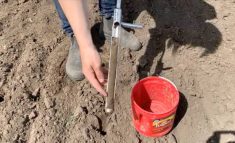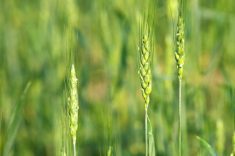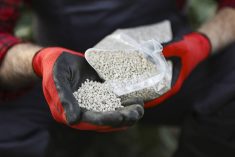Real-world tests of nitrogen-fixing bacteria products conducted across the Prairies have shown limited promise, but farm groups aren’t throwing in the towel.
“I’m not ready to close the book on these trials just yet,” said Laura Schmidt, a production specialist with Manitoba Pulse and Soybean Growers.
In 2022, MPSG ran 10 trials with Envita, which uses naturally occurring bacteria to take nitrogen from the air and make it available to crops. It’s a potentially huge advance that could boost crop quality and yield while reducing fertilizer bills (and nitrous oxide emissions).
Read Also

Canadian Cattle Association names Brocklebank CEO
Andrea Brocklebank will take over as chief executive officer of the Canadian Cattle Association effective March 1.
The trials, which compared Envita-treated and untreated soybeans, dry beans and peas, showed no significant yield differences. However, with only one season’s worth of data, Schmidt said she wasn’t ready to write off the product.
A farmer who participated in an Alberta trial agreed.
“It’s too early to tell. You can’t base anything off one year’s worth of trial data,” said Erek Bishop, a participant in one of four 2022 Alberta trials Envita and Utrisha N, a similar product.
But none of the four trials conducted by farmers with the help of the Alberta Wheat and Barley commissions produced any yield bump.
Heat stress may have been a factor on his family’s farm near Barons, Alta., said Bishop, who grew durum under irrigation. And although he didn’t see a difference in test weight, he said others have.
“Growers I deal with say they never saw any yield increases but had test weight increases,” said Bishop. “They noticed their grades went from a No. 3 or 4 durum to a No. 2 or 1 durum just due to the weight difference.
“Just based on that, it more than paid for itself.”
It was the same story in the other three Alberta trials, with no significant differences in yield, test weights or protein levels. The biggest yield bump was a trial of Utrisha N on a spring wheat crop near Carstairs that yielded an extra three bushels an acre. On the other hand, the trial at Bishop Farms saw the check outyield Utrisha-N test strips by 1.4 bushels an acre and the Envita strips by 2.3 bushels.
The bottom line of the reports on all four trials was exactly the same.
“No differences were seen between treatments,” they all stated. “Therefore, the most economical treatment is the check.”
According to company reps, the suggested retail price of Envita is $16 per acre and Utrisha N has a sticker price of $15.50 per acre. Then there’s application costs, which range from $7 to $12 per acre, said Alberta Wheat and Barley agronomist Jeremy Boychyn.
Wheat results often disappoint
Boychyn said he’s still “racking his head” about the results, but it’s too early to dismiss nitrogen-fixing bacteria products on wheat.
“It just provides a little flag for producers to look at them with a very close lens and do a good test on their farm before doing any kind of a blanket application, which I know most producers do.”
The Plot2Farm trials aren’t the only instance in which nitrogen-fixing bacteria have produced underwhelming results in wheat.
While third-party trials have found clear yield gains in other crops, wheat has been a different story, a sales agronomist with Envita maker Azotic North America said during a presentation at a Farming Smarter virtual conference in December.
“We’re not seeing the same consistency as we are in corn and soybeans,” said Phil Bernardin.

A small plot trial of wheat in Manitoba also showed little yield advantage over untreated acres, although there was a small bump in protein, he said. However, that may have been a case of the crop having access to all the nitrogen it could use so the extra produced by the bacteria wasn’t needed.
Another small plot replicated trial in Manitoba showed a small yield boost (about four bushels per acre) over the untreated control with no significant change in protein.
Still, the product has regularly delivered significant yield gains on corn, potatoes and soybeans and showed promise on canola, said Bernardin, and trials on corn conducted in the U.S. Midwest since 2019 have shown consistent yield gains.
“That’s partly because it’s really hard to over-fertilize corn,” he said. “It needs a lot of N so Envita is always able to provide that extra boost.”
Wheat is different.
“It’s a bit more nuanced for these kind of crops in terms of how much nitrogen we add and what kind of response you’re going to get,” he said.
His company hopes to conduct large-scale demonstration trials in farmers’ fields this year to compare different nitrogen rates on wheat and canola crops under Envita, said Bernardin.
How they work
Both Utrisha N and Envita fall into a category called biostimulants.
Corteva Agriscience Canada launched Utrisha N just over two years ago and has run plot trials across Western Canada. The foliar-applied product enters through the stomata, colonizes in the leaf and converts nitrogen from the air into ammonium.
Corteva hasn’t posted results from last year’s trials, but those in 2021 found Utrisha N only increased per-acre wheat yield by an extra 1.1 bushels. It was a similar story for canola, but the company says the drought of 2021 skewed results.
Syngenta announced last spring that it had secured distribution rights to Envita in Canada and it will be available commercially this year. Growers can either apply it foliarly or put it in furrow to colonize the plant. By working within plant cells, the bacterium “provides nitrogen exactly where it is most needed,” the company says on its website.
In corn, Envita appears to improve yield by reducing ‘tip back’ (withering) at the end of corn ears, a condition that results in fewer and/or immature kernels, said Bernardin.
“We’re not getting bigger kernels; the thousand-kernel weights are always pretty much the same. But what we’re seeing is more kernels getting to maturity and that’s leading to higher yield.”
The bacteria also appeared to bring corn to maturity faster.
“Our thought process is if Envita is in the plant, it’s always kind of feeding that nitrogen. There’s no kind of stall or delay in growth,” said Bernardin.
Applying Envita on potatoes produced a nearly three-tonne-per-acre increase in a southern Alberta demonstration trial, he said, adding that’s likely because spuds are an N-hungry plant, too.
“Potatoes need a lot of nitrogen and it’s kind of hard to over-fertilize them.”
Bernardin said more research is needed to establish the best practices compatible with the product when used on spring wheat. However, lack of a yield response could have been for any number of reasons, says Boychyn.
Perhaps the bacteria didn’t fully spread through the wheat plants or somehow didn’t spread properly and so weren’t able to supply enough N to make a difference.
“Even if it infected and infected well, did it do that throughout the whole growing season?” he said. “Maybe the stress periods in August when it was drier (created a problem).”
Interest still high
The Manitoba Crop Alliance will test Envita on grain corn in 2023.
“There has been a steady increase in interest from our farmer members in these types of products, particularly as pressure increases to improve nutrient use efficiency,” said Ashley Ammeter, an agronomy extension specialist with the MCA.
Farmers interested in participating can contact Daryl Rex, research trial specialist with the Manitoba Crop Alliance, at [email protected] or call 204-745-6661.
– Portions of this article were originally published at the Alberta Farmer Express.


















